Developing Manager Report: Management Skills, Leadership and Culture
VerifiedAdded on 2020/10/23
|10
|2775
|203
Report
AI Summary
This report, focused on the role of a developing manager, delves into various management styles, including autocratic, consultative, and democratic approaches, and contrasts them based on their effectiveness in different situations. It explores crucial leadership characteristics such as honesty, inspiration, and the ability to handle challenging situations. The report also examines communication processes, encompassing verbal, non-verbal, and written methods, within the context of the travel and tourism sector, specifically referencing Thomas Cook. Furthermore, it analyzes organizational culture and change, emphasizing the significance of a sustainable and supportive environment. Task 2 assesses the author's own management skills, strengths, weaknesses, opportunities, and threats, setting targets for personal development. The report also addresses team motivation, decision verification, and personal and managerial skills that support career development. The author provides a comprehensive overview of how managers can effectively lead and contribute to organizational success, particularly within the dynamic context of the travel and tourism industry.
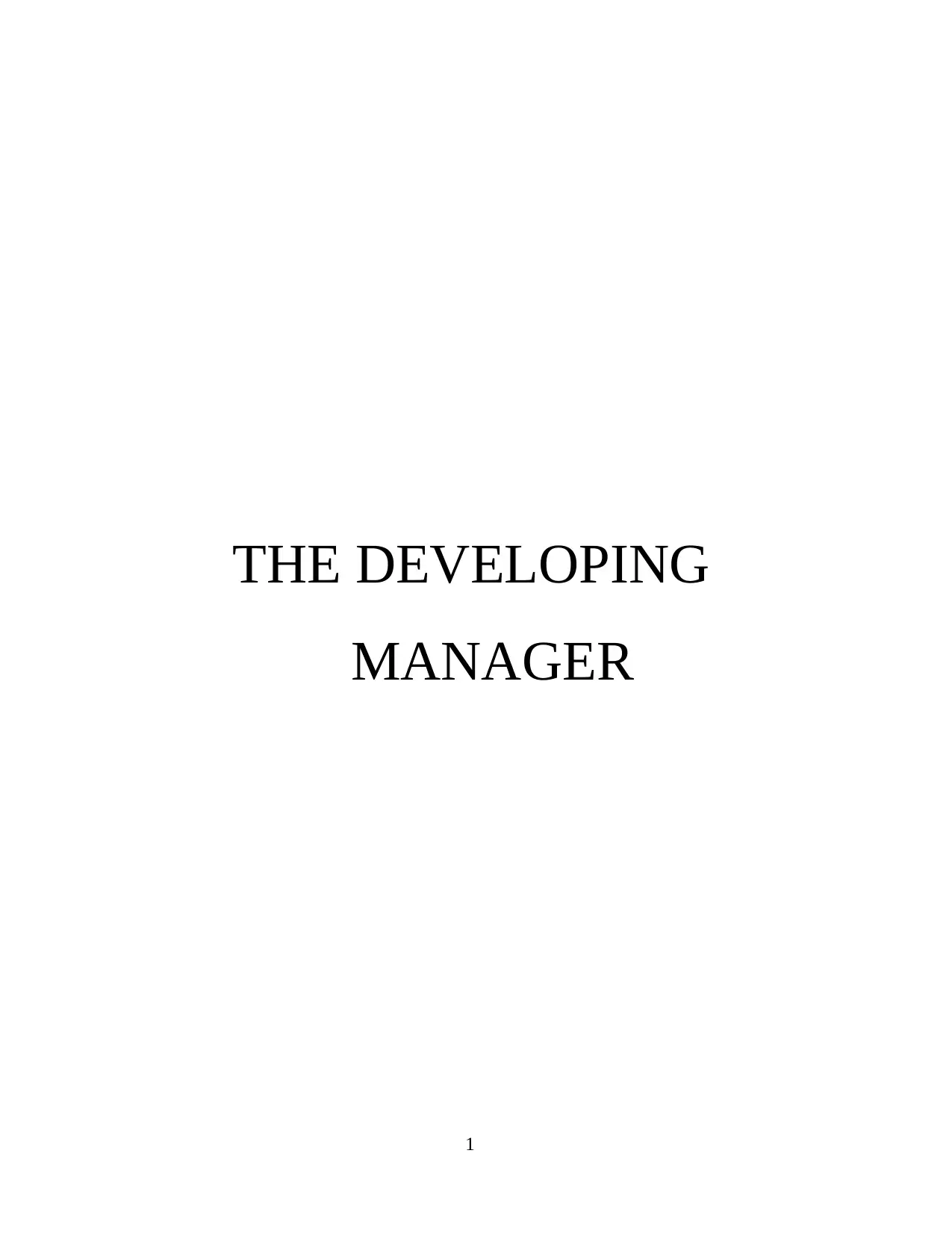
THE DEVELOPING
MANAGER
1
MANAGER
1
Paraphrase This Document
Need a fresh take? Get an instant paraphrase of this document with our AI Paraphraser
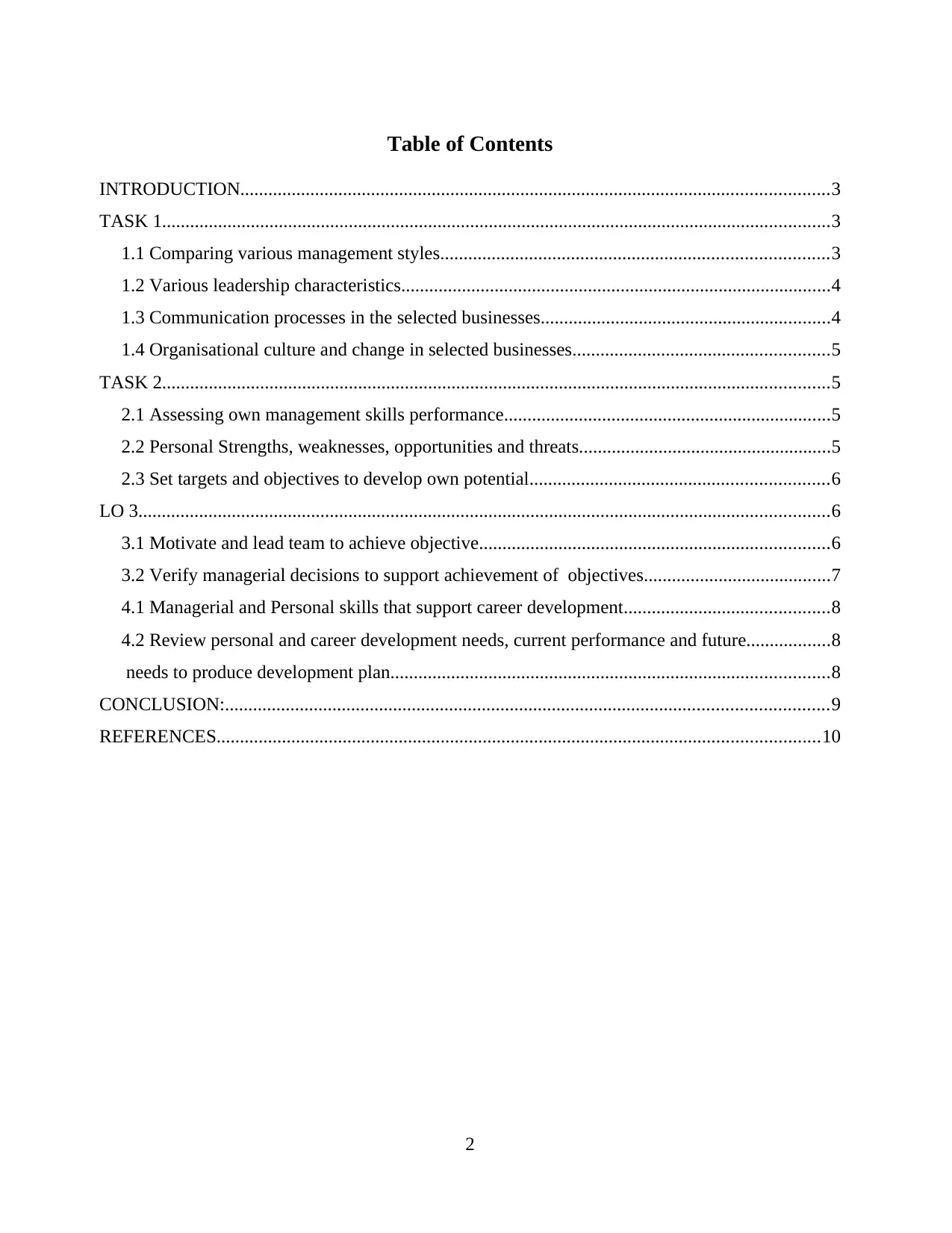
Table of Contents
INTRODUCTION..............................................................................................................................3
TASK 1...............................................................................................................................................3
1.1 Comparing various management styles...................................................................................3
1.2 Various leadership characteristics............................................................................................4
1.3 Communication processes in the selected businesses..............................................................4
1.4 Organisational culture and change in selected businesses.......................................................5
TASK 2...............................................................................................................................................5
2.1 Assessing own management skills performance......................................................................5
2.2 Personal Strengths, weaknesses, opportunities and threats......................................................5
2.3 Set targets and objectives to develop own potential................................................................6
LO 3....................................................................................................................................................6
3.1 Motivate and lead team to achieve objective...........................................................................6
3.2 Verify managerial decisions to support achievement of objectives........................................7
4.1 Managerial and Personal skills that support career development............................................8
4.2 Review personal and career development needs, current performance and future..................8
needs to produce development plan..............................................................................................8
CONCLUSION:.................................................................................................................................9
REFERENCES.................................................................................................................................10
2
INTRODUCTION..............................................................................................................................3
TASK 1...............................................................................................................................................3
1.1 Comparing various management styles...................................................................................3
1.2 Various leadership characteristics............................................................................................4
1.3 Communication processes in the selected businesses..............................................................4
1.4 Organisational culture and change in selected businesses.......................................................5
TASK 2...............................................................................................................................................5
2.1 Assessing own management skills performance......................................................................5
2.2 Personal Strengths, weaknesses, opportunities and threats......................................................5
2.3 Set targets and objectives to develop own potential................................................................6
LO 3....................................................................................................................................................6
3.1 Motivate and lead team to achieve objective...........................................................................6
3.2 Verify managerial decisions to support achievement of objectives........................................7
4.1 Managerial and Personal skills that support career development............................................8
4.2 Review personal and career development needs, current performance and future..................8
needs to produce development plan..............................................................................................8
CONCLUSION:.................................................................................................................................9
REFERENCES.................................................................................................................................10
2
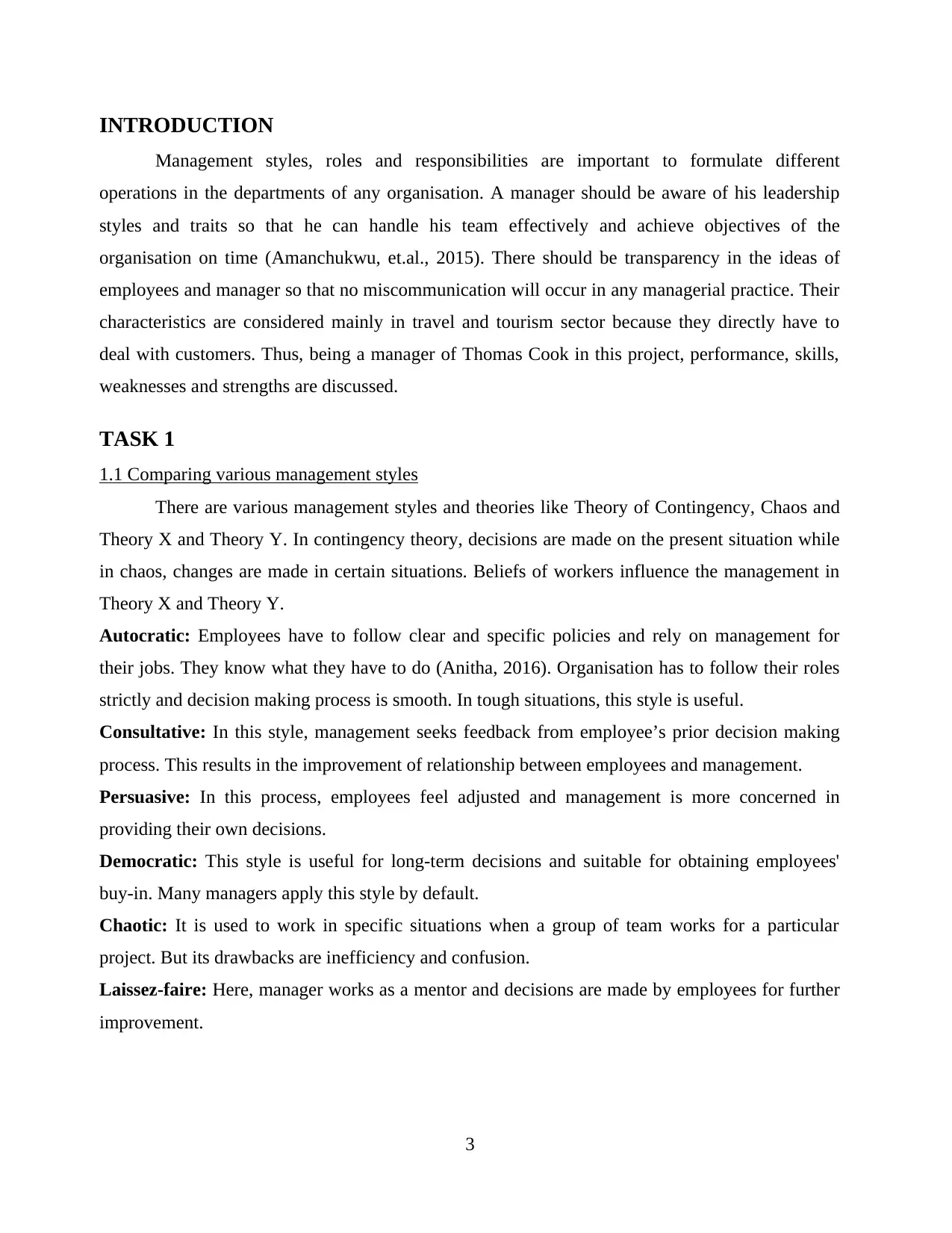
INTRODUCTION
Management styles, roles and responsibilities are important to formulate different
operations in the departments of any organisation. A manager should be aware of his leadership
styles and traits so that he can handle his team effectively and achieve objectives of the
organisation on time (Amanchukwu, et.al., 2015). There should be transparency in the ideas of
employees and manager so that no miscommunication will occur in any managerial practice. Their
characteristics are considered mainly in travel and tourism sector because they directly have to
deal with customers. Thus, being a manager of Thomas Cook in this project, performance, skills,
weaknesses and strengths are discussed.
TASK 1
1.1 Comparing various management styles
There are various management styles and theories like Theory of Contingency, Chaos and
Theory X and Theory Y. In contingency theory, decisions are made on the present situation while
in chaos, changes are made in certain situations. Beliefs of workers influence the management in
Theory X and Theory Y.
Autocratic: Employees have to follow clear and specific policies and rely on management for
their jobs. They know what they have to do (Anitha, 2016). Organisation has to follow their roles
strictly and decision making process is smooth. In tough situations, this style is useful.
Consultative: In this style, management seeks feedback from employee’s prior decision making
process. This results in the improvement of relationship between employees and management.
Persuasive: In this process, employees feel adjusted and management is more concerned in
providing their own decisions.
Democratic: This style is useful for long-term decisions and suitable for obtaining employees'
buy-in. Many managers apply this style by default.
Chaotic: It is used to work in specific situations when a group of team works for a particular
project. But its drawbacks are inefficiency and confusion.
Laissez-faire: Here, manager works as a mentor and decisions are made by employees for further
improvement.
3
Management styles, roles and responsibilities are important to formulate different
operations in the departments of any organisation. A manager should be aware of his leadership
styles and traits so that he can handle his team effectively and achieve objectives of the
organisation on time (Amanchukwu, et.al., 2015). There should be transparency in the ideas of
employees and manager so that no miscommunication will occur in any managerial practice. Their
characteristics are considered mainly in travel and tourism sector because they directly have to
deal with customers. Thus, being a manager of Thomas Cook in this project, performance, skills,
weaknesses and strengths are discussed.
TASK 1
1.1 Comparing various management styles
There are various management styles and theories like Theory of Contingency, Chaos and
Theory X and Theory Y. In contingency theory, decisions are made on the present situation while
in chaos, changes are made in certain situations. Beliefs of workers influence the management in
Theory X and Theory Y.
Autocratic: Employees have to follow clear and specific policies and rely on management for
their jobs. They know what they have to do (Anitha, 2016). Organisation has to follow their roles
strictly and decision making process is smooth. In tough situations, this style is useful.
Consultative: In this style, management seeks feedback from employee’s prior decision making
process. This results in the improvement of relationship between employees and management.
Persuasive: In this process, employees feel adjusted and management is more concerned in
providing their own decisions.
Democratic: This style is useful for long-term decisions and suitable for obtaining employees'
buy-in. Many managers apply this style by default.
Chaotic: It is used to work in specific situations when a group of team works for a particular
project. But its drawbacks are inefficiency and confusion.
Laissez-faire: Here, manager works as a mentor and decisions are made by employees for further
improvement.
3
⊘ This is a preview!⊘
Do you want full access?
Subscribe today to unlock all pages.

Trusted by 1+ million students worldwide
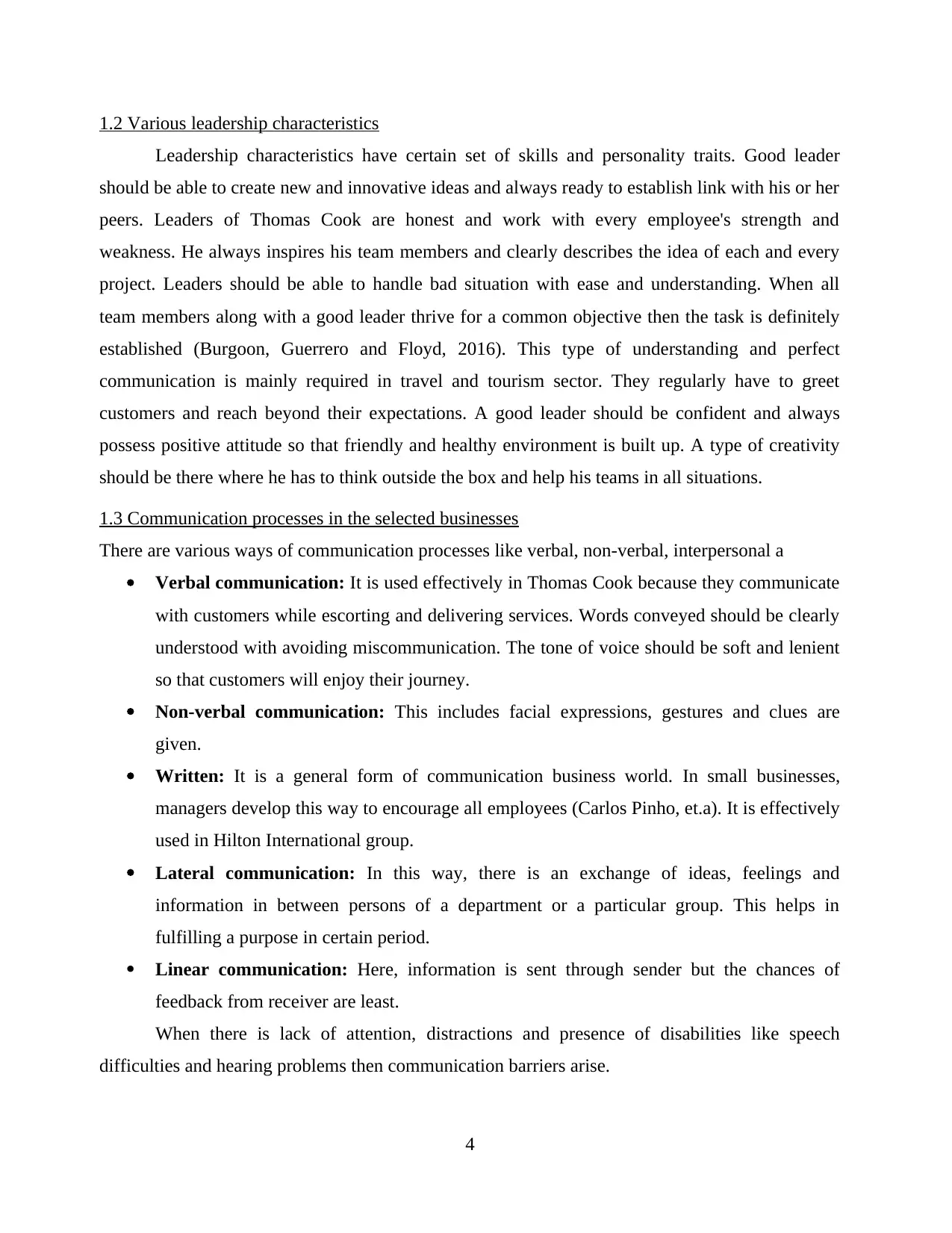
1.2 Various leadership characteristics
Leadership characteristics have certain set of skills and personality traits. Good leader
should be able to create new and innovative ideas and always ready to establish link with his or her
peers. Leaders of Thomas Cook are honest and work with every employee's strength and
weakness. He always inspires his team members and clearly describes the idea of each and every
project. Leaders should be able to handle bad situation with ease and understanding. When all
team members along with a good leader thrive for a common objective then the task is definitely
established (Burgoon, Guerrero and Floyd, 2016). This type of understanding and perfect
communication is mainly required in travel and tourism sector. They regularly have to greet
customers and reach beyond their expectations. A good leader should be confident and always
possess positive attitude so that friendly and healthy environment is built up. A type of creativity
should be there where he has to think outside the box and help his teams in all situations.
1.3 Communication processes in the selected businesses
There are various ways of communication processes like verbal, non-verbal, interpersonal a
Verbal communication: It is used effectively in Thomas Cook because they communicate
with customers while escorting and delivering services. Words conveyed should be clearly
understood with avoiding miscommunication. The tone of voice should be soft and lenient
so that customers will enjoy their journey.
Non-verbal communication: This includes facial expressions, gestures and clues are
given.
Written: It is a general form of communication business world. In small businesses,
managers develop this way to encourage all employees (Carlos Pinho, et.a). It is effectively
used in Hilton International group.
Lateral communication: In this way, there is an exchange of ideas, feelings and
information in between persons of a department or a particular group. This helps in
fulfilling a purpose in certain period.
Linear communication: Here, information is sent through sender but the chances of
feedback from receiver are least.
When there is lack of attention, distractions and presence of disabilities like speech
difficulties and hearing problems then communication barriers arise.
4
Leadership characteristics have certain set of skills and personality traits. Good leader
should be able to create new and innovative ideas and always ready to establish link with his or her
peers. Leaders of Thomas Cook are honest and work with every employee's strength and
weakness. He always inspires his team members and clearly describes the idea of each and every
project. Leaders should be able to handle bad situation with ease and understanding. When all
team members along with a good leader thrive for a common objective then the task is definitely
established (Burgoon, Guerrero and Floyd, 2016). This type of understanding and perfect
communication is mainly required in travel and tourism sector. They regularly have to greet
customers and reach beyond their expectations. A good leader should be confident and always
possess positive attitude so that friendly and healthy environment is built up. A type of creativity
should be there where he has to think outside the box and help his teams in all situations.
1.3 Communication processes in the selected businesses
There are various ways of communication processes like verbal, non-verbal, interpersonal a
Verbal communication: It is used effectively in Thomas Cook because they communicate
with customers while escorting and delivering services. Words conveyed should be clearly
understood with avoiding miscommunication. The tone of voice should be soft and lenient
so that customers will enjoy their journey.
Non-verbal communication: This includes facial expressions, gestures and clues are
given.
Written: It is a general form of communication business world. In small businesses,
managers develop this way to encourage all employees (Carlos Pinho, et.a). It is effectively
used in Hilton International group.
Lateral communication: In this way, there is an exchange of ideas, feelings and
information in between persons of a department or a particular group. This helps in
fulfilling a purpose in certain period.
Linear communication: Here, information is sent through sender but the chances of
feedback from receiver are least.
When there is lack of attention, distractions and presence of disabilities like speech
difficulties and hearing problems then communication barriers arise.
4
Paraphrase This Document
Need a fresh take? Get an instant paraphrase of this document with our AI Paraphraser
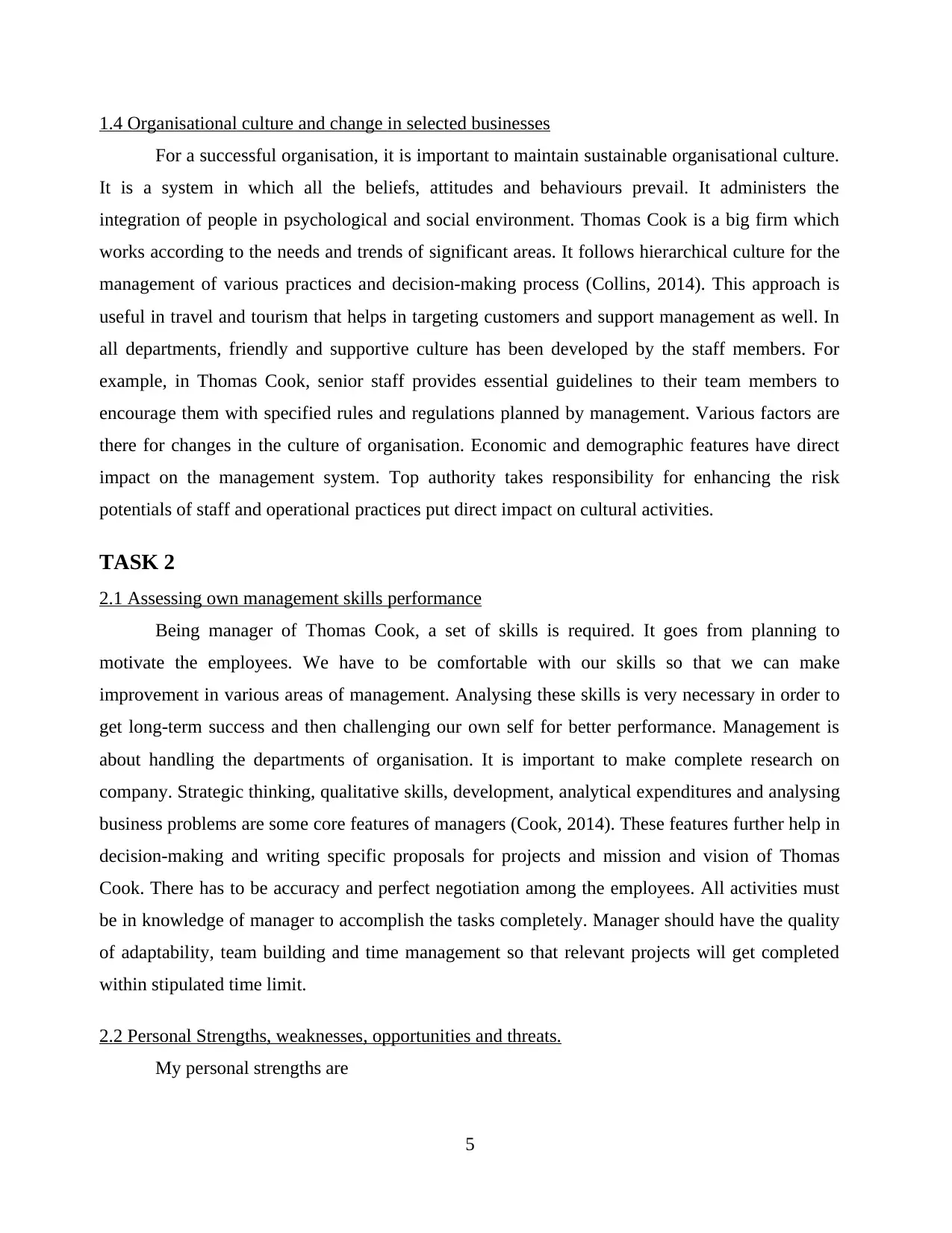
1.4 Organisational culture and change in selected businesses
For a successful organisation, it is important to maintain sustainable organisational culture.
It is a system in which all the beliefs, attitudes and behaviours prevail. It administers the
integration of people in psychological and social environment. Thomas Cook is a big firm which
works according to the needs and trends of significant areas. It follows hierarchical culture for the
management of various practices and decision-making process (Collins, 2014). This approach is
useful in travel and tourism that helps in targeting customers and support management as well. In
all departments, friendly and supportive culture has been developed by the staff members. For
example, in Thomas Cook, senior staff provides essential guidelines to their team members to
encourage them with specified rules and regulations planned by management. Various factors are
there for changes in the culture of organisation. Economic and demographic features have direct
impact on the management system. Top authority takes responsibility for enhancing the risk
potentials of staff and operational practices put direct impact on cultural activities.
TASK 2
2.1 Assessing own management skills performance
Being manager of Thomas Cook, a set of skills is required. It goes from planning to
motivate the employees. We have to be comfortable with our skills so that we can make
improvement in various areas of management. Analysing these skills is very necessary in order to
get long-term success and then challenging our own self for better performance. Management is
about handling the departments of organisation. It is important to make complete research on
company. Strategic thinking, qualitative skills, development, analytical expenditures and analysing
business problems are some core features of managers (Cook, 2014). These features further help in
decision-making and writing specific proposals for projects and mission and vision of Thomas
Cook. There has to be accuracy and perfect negotiation among the employees. All activities must
be in knowledge of manager to accomplish the tasks completely. Manager should have the quality
of adaptability, team building and time management so that relevant projects will get completed
within stipulated time limit.
2.2 Personal Strengths, weaknesses, opportunities and threats.
My personal strengths are
5
For a successful organisation, it is important to maintain sustainable organisational culture.
It is a system in which all the beliefs, attitudes and behaviours prevail. It administers the
integration of people in psychological and social environment. Thomas Cook is a big firm which
works according to the needs and trends of significant areas. It follows hierarchical culture for the
management of various practices and decision-making process (Collins, 2014). This approach is
useful in travel and tourism that helps in targeting customers and support management as well. In
all departments, friendly and supportive culture has been developed by the staff members. For
example, in Thomas Cook, senior staff provides essential guidelines to their team members to
encourage them with specified rules and regulations planned by management. Various factors are
there for changes in the culture of organisation. Economic and demographic features have direct
impact on the management system. Top authority takes responsibility for enhancing the risk
potentials of staff and operational practices put direct impact on cultural activities.
TASK 2
2.1 Assessing own management skills performance
Being manager of Thomas Cook, a set of skills is required. It goes from planning to
motivate the employees. We have to be comfortable with our skills so that we can make
improvement in various areas of management. Analysing these skills is very necessary in order to
get long-term success and then challenging our own self for better performance. Management is
about handling the departments of organisation. It is important to make complete research on
company. Strategic thinking, qualitative skills, development, analytical expenditures and analysing
business problems are some core features of managers (Cook, 2014). These features further help in
decision-making and writing specific proposals for projects and mission and vision of Thomas
Cook. There has to be accuracy and perfect negotiation among the employees. All activities must
be in knowledge of manager to accomplish the tasks completely. Manager should have the quality
of adaptability, team building and time management so that relevant projects will get completed
within stipulated time limit.
2.2 Personal Strengths, weaknesses, opportunities and threats.
My personal strengths are
5
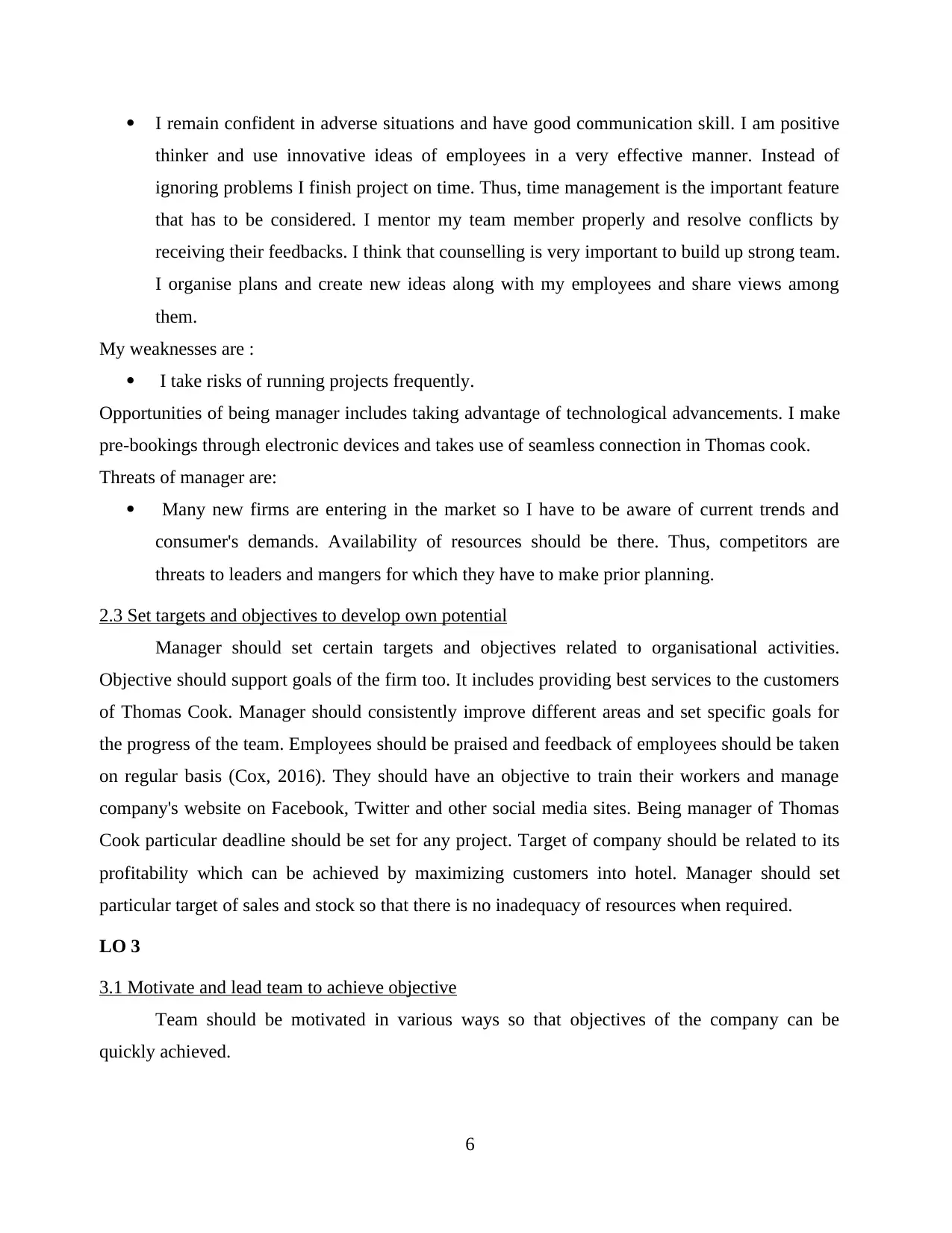
I remain confident in adverse situations and have good communication skill. I am positive
thinker and use innovative ideas of employees in a very effective manner. Instead of
ignoring problems I finish project on time. Thus, time management is the important feature
that has to be considered. I mentor my team member properly and resolve conflicts by
receiving their feedbacks. I think that counselling is very important to build up strong team.
I organise plans and create new ideas along with my employees and share views among
them.
My weaknesses are :
I take risks of running projects frequently.
Opportunities of being manager includes taking advantage of technological advancements. I make
pre-bookings through electronic devices and takes use of seamless connection in Thomas cook.
Threats of manager are:
Many new firms are entering in the market so I have to be aware of current trends and
consumer's demands. Availability of resources should be there. Thus, competitors are
threats to leaders and mangers for which they have to make prior planning.
2.3 Set targets and objectives to develop own potential
Manager should set certain targets and objectives related to organisational activities.
Objective should support goals of the firm too. It includes providing best services to the customers
of Thomas Cook. Manager should consistently improve different areas and set specific goals for
the progress of the team. Employees should be praised and feedback of employees should be taken
on regular basis (Cox, 2016). They should have an objective to train their workers and manage
company's website on Facebook, Twitter and other social media sites. Being manager of Thomas
Cook particular deadline should be set for any project. Target of company should be related to its
profitability which can be achieved by maximizing customers into hotel. Manager should set
particular target of sales and stock so that there is no inadequacy of resources when required.
LO 3
3.1 Motivate and lead team to achieve objective
Team should be motivated in various ways so that objectives of the company can be
quickly achieved.
6
thinker and use innovative ideas of employees in a very effective manner. Instead of
ignoring problems I finish project on time. Thus, time management is the important feature
that has to be considered. I mentor my team member properly and resolve conflicts by
receiving their feedbacks. I think that counselling is very important to build up strong team.
I organise plans and create new ideas along with my employees and share views among
them.
My weaknesses are :
I take risks of running projects frequently.
Opportunities of being manager includes taking advantage of technological advancements. I make
pre-bookings through electronic devices and takes use of seamless connection in Thomas cook.
Threats of manager are:
Many new firms are entering in the market so I have to be aware of current trends and
consumer's demands. Availability of resources should be there. Thus, competitors are
threats to leaders and mangers for which they have to make prior planning.
2.3 Set targets and objectives to develop own potential
Manager should set certain targets and objectives related to organisational activities.
Objective should support goals of the firm too. It includes providing best services to the customers
of Thomas Cook. Manager should consistently improve different areas and set specific goals for
the progress of the team. Employees should be praised and feedback of employees should be taken
on regular basis (Cox, 2016). They should have an objective to train their workers and manage
company's website on Facebook, Twitter and other social media sites. Being manager of Thomas
Cook particular deadline should be set for any project. Target of company should be related to its
profitability which can be achieved by maximizing customers into hotel. Manager should set
particular target of sales and stock so that there is no inadequacy of resources when required.
LO 3
3.1 Motivate and lead team to achieve objective
Team should be motivated in various ways so that objectives of the company can be
quickly achieved.
6
⊘ This is a preview!⊘
Do you want full access?
Subscribe today to unlock all pages.

Trusted by 1+ million students worldwide
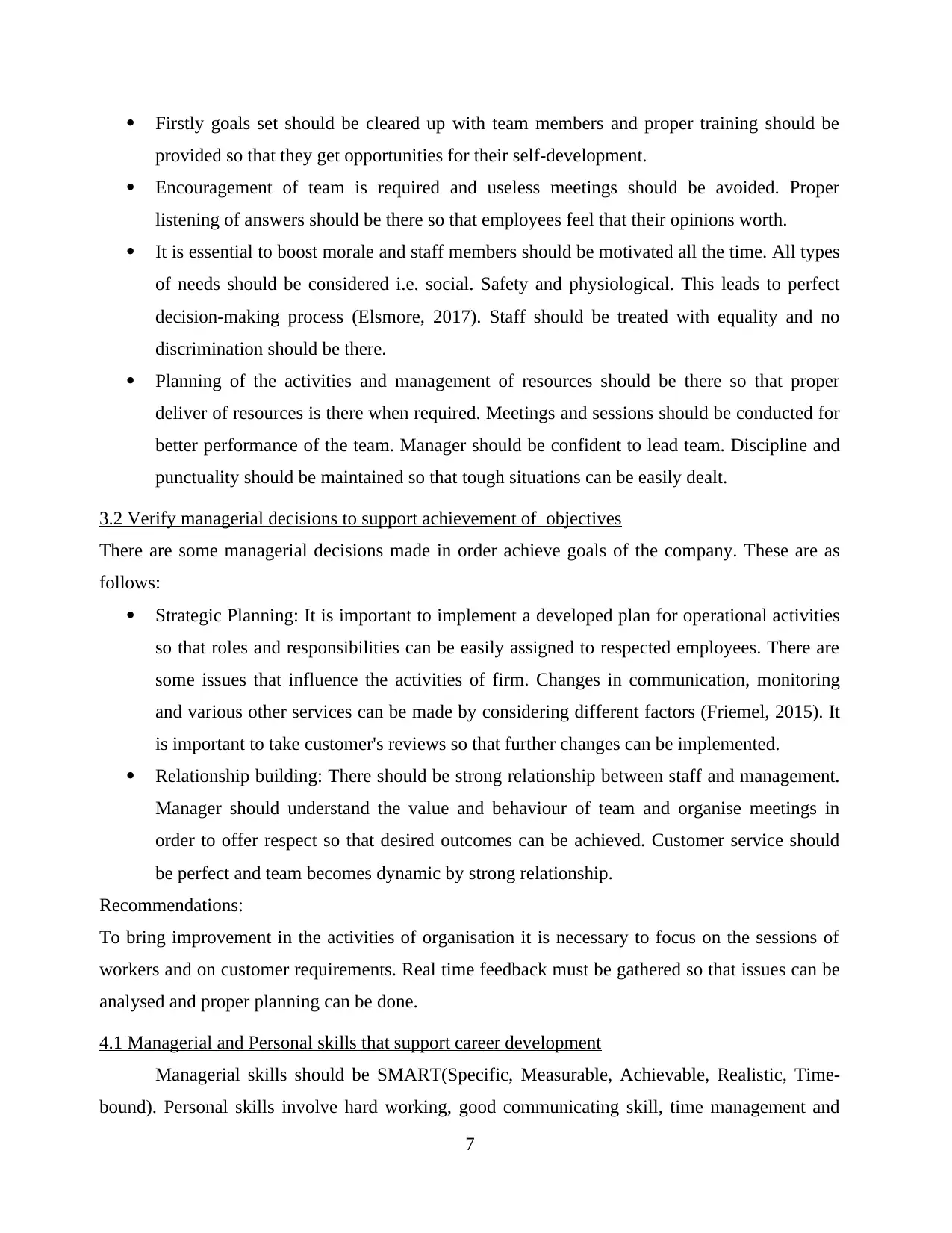
Firstly goals set should be cleared up with team members and proper training should be
provided so that they get opportunities for their self-development.
Encouragement of team is required and useless meetings should be avoided. Proper
listening of answers should be there so that employees feel that their opinions worth.
It is essential to boost morale and staff members should be motivated all the time. All types
of needs should be considered i.e. social. Safety and physiological. This leads to perfect
decision-making process (Elsmore, 2017). Staff should be treated with equality and no
discrimination should be there.
Planning of the activities and management of resources should be there so that proper
deliver of resources is there when required. Meetings and sessions should be conducted for
better performance of the team. Manager should be confident to lead team. Discipline and
punctuality should be maintained so that tough situations can be easily dealt.
3.2 Verify managerial decisions to support achievement of objectives
There are some managerial decisions made in order achieve goals of the company. These are as
follows:
Strategic Planning: It is important to implement a developed plan for operational activities
so that roles and responsibilities can be easily assigned to respected employees. There are
some issues that influence the activities of firm. Changes in communication, monitoring
and various other services can be made by considering different factors (Friemel, 2015). It
is important to take customer's reviews so that further changes can be implemented.
Relationship building: There should be strong relationship between staff and management.
Manager should understand the value and behaviour of team and organise meetings in
order to offer respect so that desired outcomes can be achieved. Customer service should
be perfect and team becomes dynamic by strong relationship.
Recommendations:
To bring improvement in the activities of organisation it is necessary to focus on the sessions of
workers and on customer requirements. Real time feedback must be gathered so that issues can be
analysed and proper planning can be done.
4.1 Managerial and Personal skills that support career development
Managerial skills should be SMART(Specific, Measurable, Achievable, Realistic, Time-
bound). Personal skills involve hard working, good communicating skill, time management and
7
provided so that they get opportunities for their self-development.
Encouragement of team is required and useless meetings should be avoided. Proper
listening of answers should be there so that employees feel that their opinions worth.
It is essential to boost morale and staff members should be motivated all the time. All types
of needs should be considered i.e. social. Safety and physiological. This leads to perfect
decision-making process (Elsmore, 2017). Staff should be treated with equality and no
discrimination should be there.
Planning of the activities and management of resources should be there so that proper
deliver of resources is there when required. Meetings and sessions should be conducted for
better performance of the team. Manager should be confident to lead team. Discipline and
punctuality should be maintained so that tough situations can be easily dealt.
3.2 Verify managerial decisions to support achievement of objectives
There are some managerial decisions made in order achieve goals of the company. These are as
follows:
Strategic Planning: It is important to implement a developed plan for operational activities
so that roles and responsibilities can be easily assigned to respected employees. There are
some issues that influence the activities of firm. Changes in communication, monitoring
and various other services can be made by considering different factors (Friemel, 2015). It
is important to take customer's reviews so that further changes can be implemented.
Relationship building: There should be strong relationship between staff and management.
Manager should understand the value and behaviour of team and organise meetings in
order to offer respect so that desired outcomes can be achieved. Customer service should
be perfect and team becomes dynamic by strong relationship.
Recommendations:
To bring improvement in the activities of organisation it is necessary to focus on the sessions of
workers and on customer requirements. Real time feedback must be gathered so that issues can be
analysed and proper planning can be done.
4.1 Managerial and Personal skills that support career development
Managerial skills should be SMART(Specific, Measurable, Achievable, Realistic, Time-
bound). Personal skills involve hard working, good communicating skill, time management and
7
Paraphrase This Document
Need a fresh take? Get an instant paraphrase of this document with our AI Paraphraser
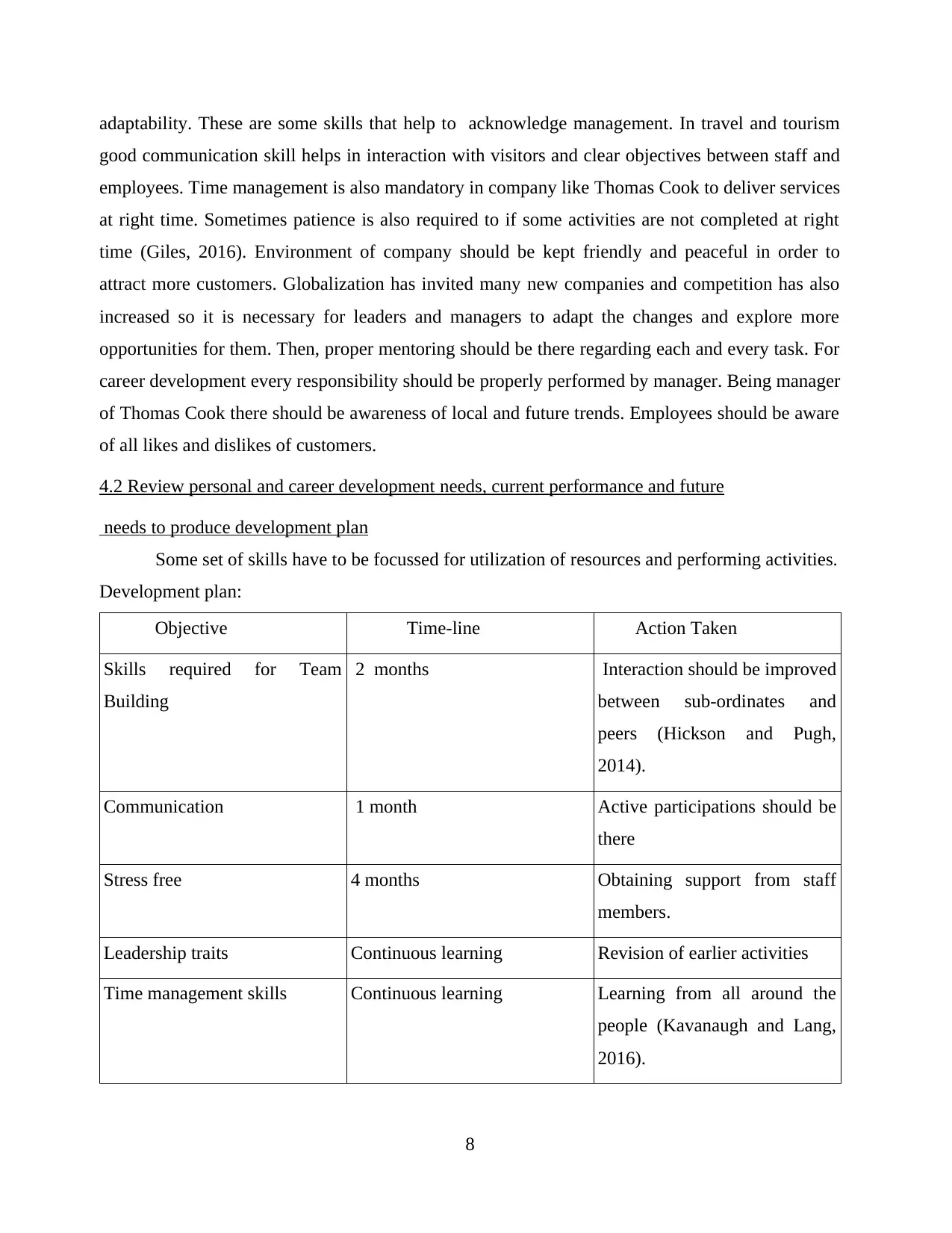
adaptability. These are some skills that help to acknowledge management. In travel and tourism
good communication skill helps in interaction with visitors and clear objectives between staff and
employees. Time management is also mandatory in company like Thomas Cook to deliver services
at right time. Sometimes patience is also required to if some activities are not completed at right
time (Giles, 2016). Environment of company should be kept friendly and peaceful in order to
attract more customers. Globalization has invited many new companies and competition has also
increased so it is necessary for leaders and managers to adapt the changes and explore more
opportunities for them. Then, proper mentoring should be there regarding each and every task. For
career development every responsibility should be properly performed by manager. Being manager
of Thomas Cook there should be awareness of local and future trends. Employees should be aware
of all likes and dislikes of customers.
4.2 Review personal and career development needs, current performance and future
needs to produce development plan
Some set of skills have to be focussed for utilization of resources and performing activities.
Development plan:
Objective Time-line Action Taken
Skills required for Team
Building
2 months Interaction should be improved
between sub-ordinates and
peers (Hickson and Pugh,
2014).
Communication 1 month Active participations should be
there
Stress free 4 months Obtaining support from staff
members.
Leadership traits Continuous learning Revision of earlier activities
Time management skills Continuous learning Learning from all around the
people (Kavanaugh and Lang,
2016).
8
good communication skill helps in interaction with visitors and clear objectives between staff and
employees. Time management is also mandatory in company like Thomas Cook to deliver services
at right time. Sometimes patience is also required to if some activities are not completed at right
time (Giles, 2016). Environment of company should be kept friendly and peaceful in order to
attract more customers. Globalization has invited many new companies and competition has also
increased so it is necessary for leaders and managers to adapt the changes and explore more
opportunities for them. Then, proper mentoring should be there regarding each and every task. For
career development every responsibility should be properly performed by manager. Being manager
of Thomas Cook there should be awareness of local and future trends. Employees should be aware
of all likes and dislikes of customers.
4.2 Review personal and career development needs, current performance and future
needs to produce development plan
Some set of skills have to be focussed for utilization of resources and performing activities.
Development plan:
Objective Time-line Action Taken
Skills required for Team
Building
2 months Interaction should be improved
between sub-ordinates and
peers (Hickson and Pugh,
2014).
Communication 1 month Active participations should be
there
Stress free 4 months Obtaining support from staff
members.
Leadership traits Continuous learning Revision of earlier activities
Time management skills Continuous learning Learning from all around the
people (Kavanaugh and Lang,
2016).
8
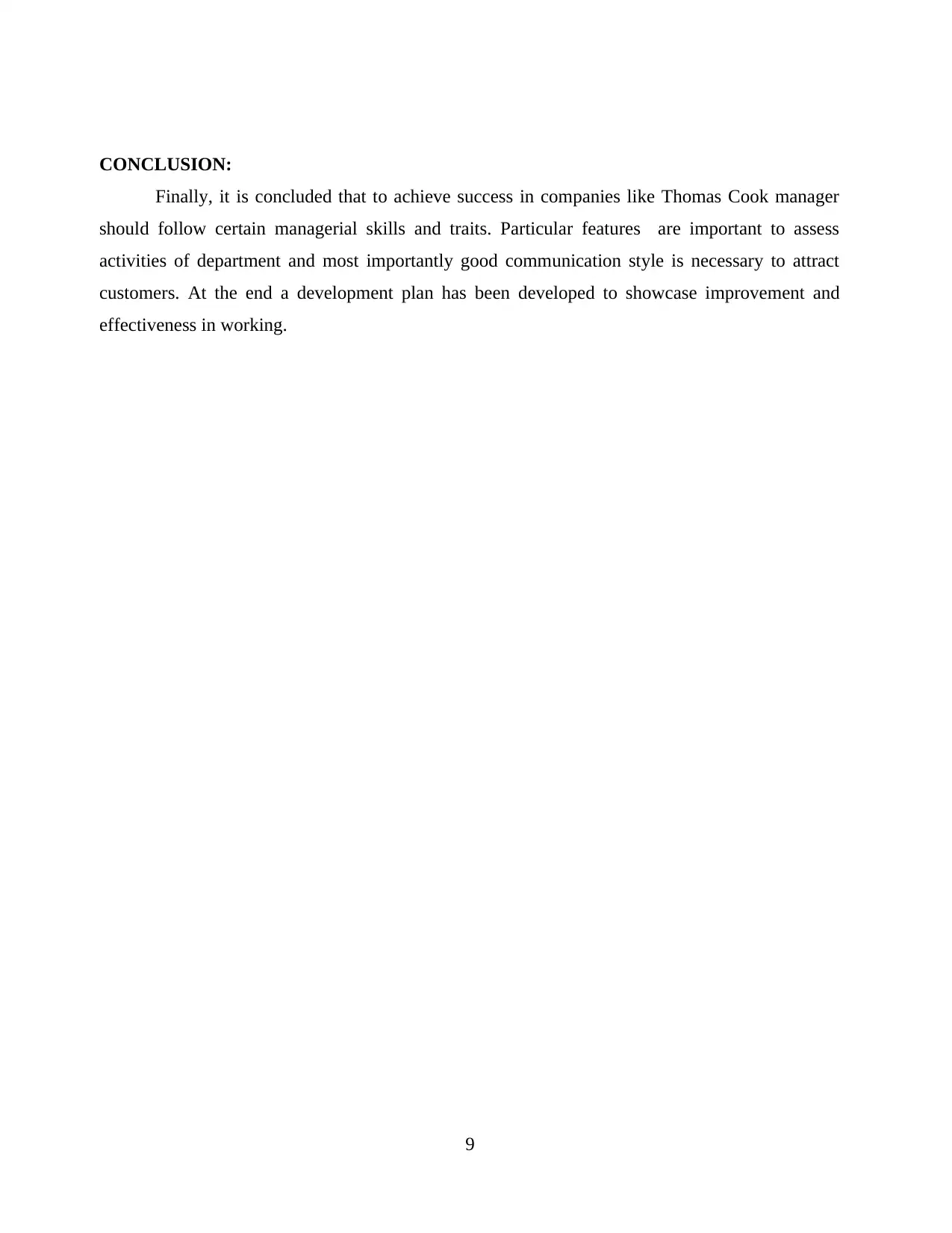
CONCLUSION:
Finally, it is concluded that to achieve success in companies like Thomas Cook manager
should follow certain managerial skills and traits. Particular features are important to assess
activities of department and most importantly good communication style is necessary to attract
customers. At the end a development plan has been developed to showcase improvement and
effectiveness in working.
9
Finally, it is concluded that to achieve success in companies like Thomas Cook manager
should follow certain managerial skills and traits. Particular features are important to assess
activities of department and most importantly good communication style is necessary to attract
customers. At the end a development plan has been developed to showcase improvement and
effectiveness in working.
9
⊘ This is a preview!⊘
Do you want full access?
Subscribe today to unlock all pages.

Trusted by 1+ million students worldwide
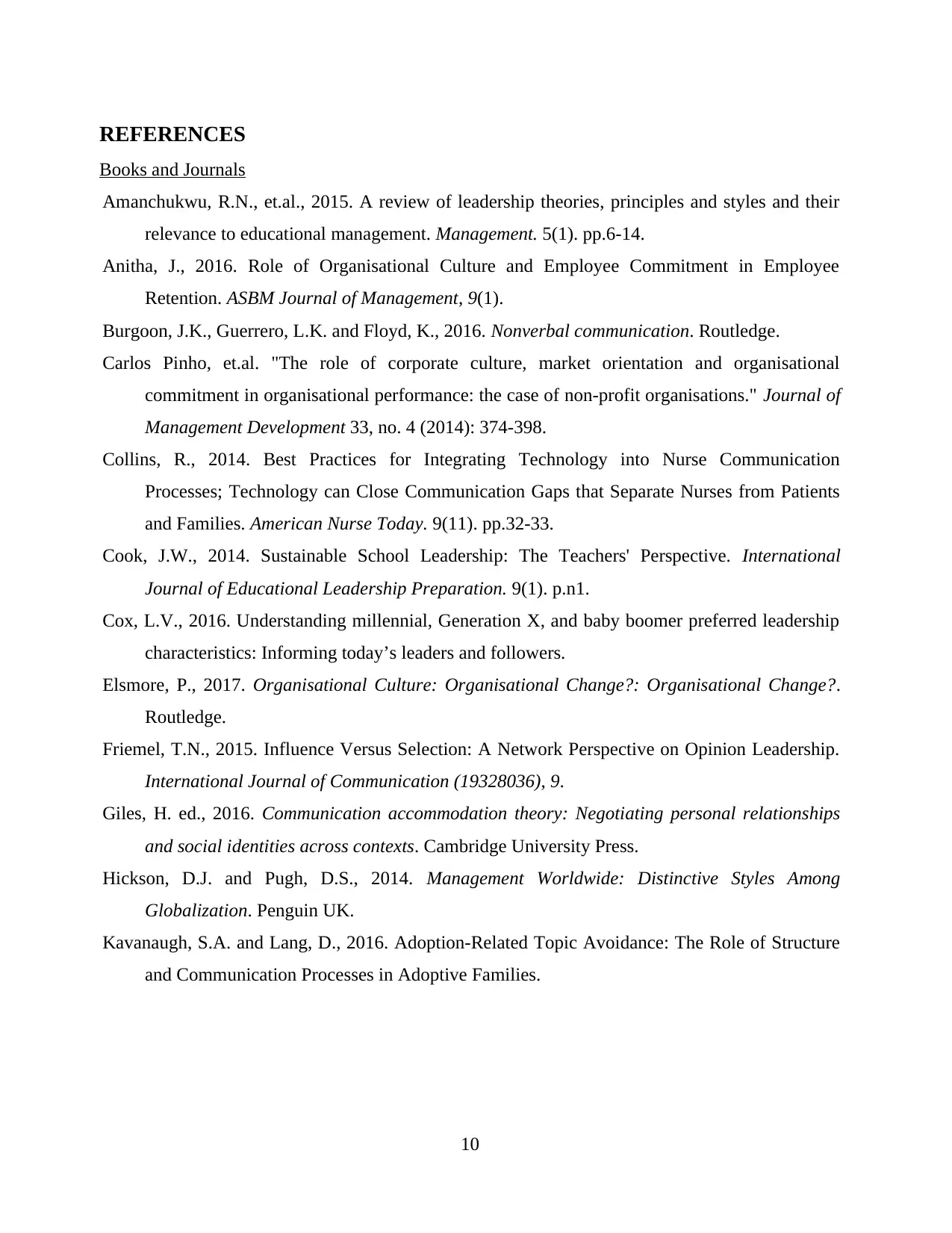
REFERENCES
Books and Journals
Amanchukwu, R.N., et.al., 2015. A review of leadership theories, principles and styles and their
relevance to educational management. Management. 5(1). pp.6-14.
Anitha, J., 2016. Role of Organisational Culture and Employee Commitment in Employee
Retention. ASBM Journal of Management, 9(1).
Burgoon, J.K., Guerrero, L.K. and Floyd, K., 2016. Nonverbal communication. Routledge.
Carlos Pinho, et.al. "The role of corporate culture, market orientation and organisational
commitment in organisational performance: the case of non-profit organisations." Journal of
Management Development 33, no. 4 (2014): 374-398.
Collins, R., 2014. Best Practices for Integrating Technology into Nurse Communication
Processes; Technology can Close Communication Gaps that Separate Nurses from Patients
and Families. American Nurse Today. 9(11). pp.32-33.
Cook, J.W., 2014. Sustainable School Leadership: The Teachers' Perspective. International
Journal of Educational Leadership Preparation. 9(1). p.n1.
Cox, L.V., 2016. Understanding millennial, Generation X, and baby boomer preferred leadership
characteristics: Informing today’s leaders and followers.
Elsmore, P., 2017. Organisational Culture: Organisational Change?: Organisational Change?.
Routledge.
Friemel, T.N., 2015. Influence Versus Selection: A Network Perspective on Opinion Leadership.
International Journal of Communication (19328036), 9.
Giles, H. ed., 2016. Communication accommodation theory: Negotiating personal relationships
and social identities across contexts. Cambridge University Press.
Hickson, D.J. and Pugh, D.S., 2014. Management Worldwide: Distinctive Styles Among
Globalization. Penguin UK.
Kavanaugh, S.A. and Lang, D., 2016. Adoption-Related Topic Avoidance: The Role of Structure
and Communication Processes in Adoptive Families.
10
Books and Journals
Amanchukwu, R.N., et.al., 2015. A review of leadership theories, principles and styles and their
relevance to educational management. Management. 5(1). pp.6-14.
Anitha, J., 2016. Role of Organisational Culture and Employee Commitment in Employee
Retention. ASBM Journal of Management, 9(1).
Burgoon, J.K., Guerrero, L.K. and Floyd, K., 2016. Nonverbal communication. Routledge.
Carlos Pinho, et.al. "The role of corporate culture, market orientation and organisational
commitment in organisational performance: the case of non-profit organisations." Journal of
Management Development 33, no. 4 (2014): 374-398.
Collins, R., 2014. Best Practices for Integrating Technology into Nurse Communication
Processes; Technology can Close Communication Gaps that Separate Nurses from Patients
and Families. American Nurse Today. 9(11). pp.32-33.
Cook, J.W., 2014. Sustainable School Leadership: The Teachers' Perspective. International
Journal of Educational Leadership Preparation. 9(1). p.n1.
Cox, L.V., 2016. Understanding millennial, Generation X, and baby boomer preferred leadership
characteristics: Informing today’s leaders and followers.
Elsmore, P., 2017. Organisational Culture: Organisational Change?: Organisational Change?.
Routledge.
Friemel, T.N., 2015. Influence Versus Selection: A Network Perspective on Opinion Leadership.
International Journal of Communication (19328036), 9.
Giles, H. ed., 2016. Communication accommodation theory: Negotiating personal relationships
and social identities across contexts. Cambridge University Press.
Hickson, D.J. and Pugh, D.S., 2014. Management Worldwide: Distinctive Styles Among
Globalization. Penguin UK.
Kavanaugh, S.A. and Lang, D., 2016. Adoption-Related Topic Avoidance: The Role of Structure
and Communication Processes in Adoptive Families.
10
1 out of 10
Related Documents
Your All-in-One AI-Powered Toolkit for Academic Success.
+13062052269
info@desklib.com
Available 24*7 on WhatsApp / Email
![[object Object]](/_next/static/media/star-bottom.7253800d.svg)
Unlock your academic potential
Copyright © 2020–2026 A2Z Services. All Rights Reserved. Developed and managed by ZUCOL.





